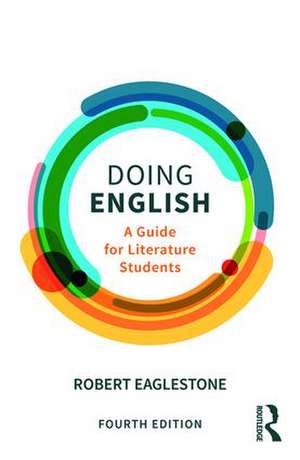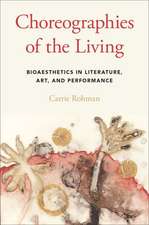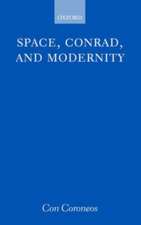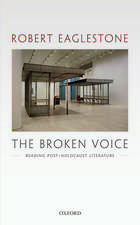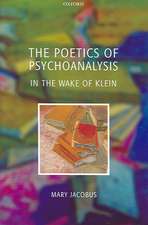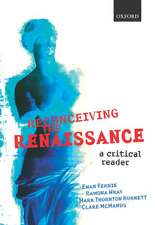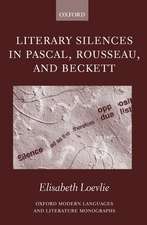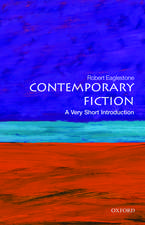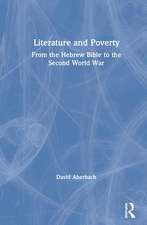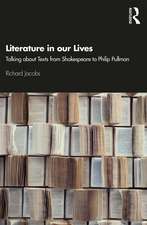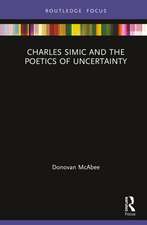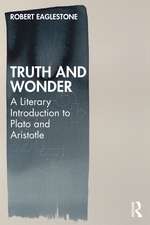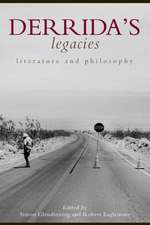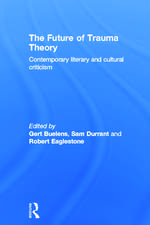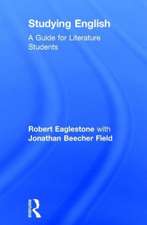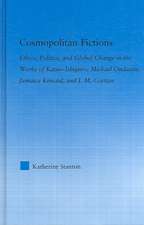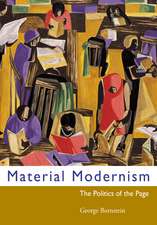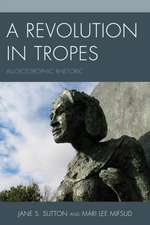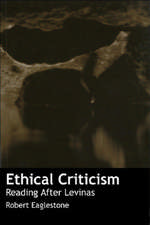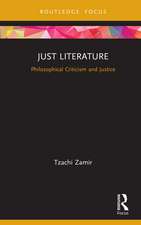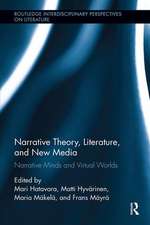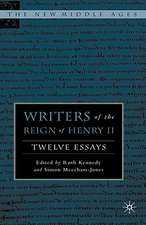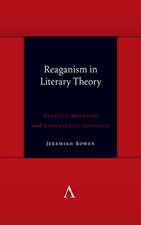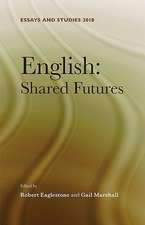Doing English: A Guide for Literature Students: Doing... Series
Autor Robert Eaglestoneen Limba Engleză Paperback – 8 aug 2017
In his lucid and engaging style, Robert Eaglestone:
- orients students by encouraging them to think about what they are doing when they study literature;
- bridges the gap between English at A-level and International Baccalaureate to English in Higher Education by exploring traditional and theoretical approaches to literature and explaining key ideas and trends;
- explains to students why English, more than any other subject, is the cause of public debate and concern in the media and amongst politicians and educators.
| Toate formatele și edițiile | Preț | Express |
|---|---|---|
| Paperback (1) | 153.60 lei 3-5 săpt. | +8.23 lei 7-13 zile |
| Taylor & Francis – 8 aug 2017 | 153.60 lei 3-5 săpt. | +8.23 lei 7-13 zile |
| Hardback (1) | 761.09 lei 6-8 săpt. | |
| Taylor & Francis – 15 aug 2017 | 761.09 lei 6-8 săpt. |
Din seria Doing... Series
-
 Preț: 203.98 lei
Preț: 203.98 lei -
 Preț: 154.49 lei
Preț: 154.49 lei -
 Preț: 206.67 lei
Preț: 206.67 lei -
 Preț: 191.46 lei
Preț: 191.46 lei - 18%
 Preț: 144.43 lei
Preț: 144.43 lei -
 Preț: 274.23 lei
Preț: 274.23 lei
Preț: 153.60 lei
Nou
Puncte Express: 230
Preț estimativ în valută:
29.39€ • 32.03$ • 24.77£
29.39€ • 32.03$ • 24.77£
Carte disponibilă
Livrare economică 02-16 aprilie
Livrare express 19-25 martie pentru 18.22 lei
Preluare comenzi: 021 569.72.76
Specificații
ISBN-13: 9781138039674
ISBN-10: 1138039675
Pagini: 198
Dimensiuni: 129 x 198 x 17 mm
Greutate: 0.2 kg
Ediția:Revised
Editura: Taylor & Francis
Colecția Routledge
Seria Doing... Series
Locul publicării:Oxford, United Kingdom
ISBN-10: 1138039675
Pagini: 198
Dimensiuni: 129 x 198 x 17 mm
Greutate: 0.2 kg
Ediția:Revised
Editura: Taylor & Francis
Colecția Routledge
Seria Doing... Series
Locul publicării:Oxford, United Kingdom
Public țintă
AS/A2 and UndergraduateCuprins
Part I - How We Read
1. Studying English
Who is this book for?
What is it for?
How to use this book
2. Where did English come from?
What are disciplines?
How did English develop?
How do those ideas still shape today?
3. Studying English Today?
Why did English change?
What do these changes mean?
What is literary theory?
What does this mean for you, studying English?
4. The Discipline of English
How do changes in the discipline affect your study of English?
What is ‘disciplinary consciousness’?
Is there a right answer in English?
Why is there ‘jargon’ in English?
How do you learn a ‘disciplinary consciousness’?
5. Critical Attitudes
Where should we start with thinking about how we read?
What is the intrinsic attitude?
What is the extrinsic attitude?
Part II - What We Read
6. Literature, Value and the Canon
Can literature be defined?
What is literary value?
What is the canon?
How does the canon affect you?
7. Castle Shakespeare
Why is Shakespeare so central to studying English literature?
What are the traditional arguments for studying Shakespeare?
What are some of the new ideas about studying Shakespeare?
How do these ideas affect the way we study Shakespeare?
8. The Author is Dead?
Who decides what a text means: the author or the reader?
What is the traditional view of the author, meaning and the text?
What are the problems with this view?
How else can we determine the meaning of the text?
Why has the author always seemed so important?
What are the consequences of all of this?
9. Metaphors and Figures of Speech
What is a figure of speech?
What are metaphors, and how do they work?
How do they affect us?
10. Narrative and Closure
Why are stories important?
How do we understand narrative and narrators?
What is closure?
11. Creative Writing and Critical Rewriting
What is creative writing?
What is intertextuality?
What is critical rewriting?
How is creative writing marked?
How has creative writing changed doing English?
12. English, Politics and Identity
What is politics, and what does English have to do with it?
What do different critical attitudes mean for the issue of literature and politics?
How does the study of literature become involved with national identity?
Why has English been a political battleground?
13. Why Study English?
Why do English at University?
Is English useful?
Is English valuable?
What skills does it involve?
Conclusion – The Importance of English
1. Studying English
Who is this book for?
What is it for?
How to use this book
2. Where did English come from?
What are disciplines?
How did English develop?
How do those ideas still shape today?
3. Studying English Today?
Why did English change?
What do these changes mean?
What is literary theory?
What does this mean for you, studying English?
4. The Discipline of English
How do changes in the discipline affect your study of English?
What is ‘disciplinary consciousness’?
Is there a right answer in English?
Why is there ‘jargon’ in English?
How do you learn a ‘disciplinary consciousness’?
5. Critical Attitudes
Where should we start with thinking about how we read?
What is the intrinsic attitude?
What is the extrinsic attitude?
Part II - What We Read
6. Literature, Value and the Canon
Can literature be defined?
What is literary value?
What is the canon?
How does the canon affect you?
7. Castle Shakespeare
Why is Shakespeare so central to studying English literature?
What are the traditional arguments for studying Shakespeare?
What are some of the new ideas about studying Shakespeare?
How do these ideas affect the way we study Shakespeare?
8. The Author is Dead?
Who decides what a text means: the author or the reader?
What is the traditional view of the author, meaning and the text?
What are the problems with this view?
How else can we determine the meaning of the text?
Why has the author always seemed so important?
What are the consequences of all of this?
9. Metaphors and Figures of Speech
What is a figure of speech?
What are metaphors, and how do they work?
How do they affect us?
10. Narrative and Closure
Why are stories important?
How do we understand narrative and narrators?
What is closure?
11. Creative Writing and Critical Rewriting
What is creative writing?
What is intertextuality?
What is critical rewriting?
How is creative writing marked?
How has creative writing changed doing English?
12. English, Politics and Identity
What is politics, and what does English have to do with it?
What do different critical attitudes mean for the issue of literature and politics?
How does the study of literature become involved with national identity?
Why has English been a political battleground?
13. Why Study English?
Why do English at University?
Is English useful?
Is English valuable?
What skills does it involve?
Conclusion – The Importance of English
Recenzii
'This new edition of Doing Englishis stunningly good. It manages the tough feat of bettering the earlier editions, which were themselves an invaluable introduction to literary study. The introduction of new material not only updates but also adds new lines of thought and addresses fresh issues at the heart of the subject. Always written in admirably clear prose, it never oversimplifies, opening up the nature of the discipline, its practices and debates, for those engaging with it for the first time.' Barbara Bleiman, Education Consultant and Co-Editor of emagazine, the English and Media Centre
Descriere
Doing English presents the ideas and debates that shape how we ‘do’ English today, explaining arguments about the value of literature, the canon, Shakespeare, theory, politics, and the subject itself. This immensely readable book is the ideal introduction to studying English Literature.
